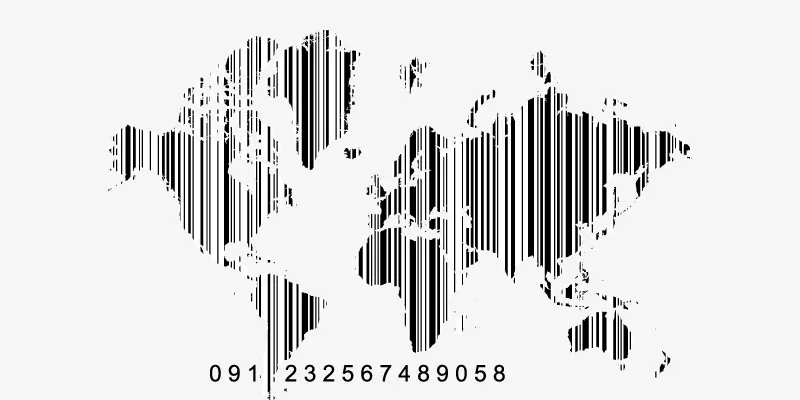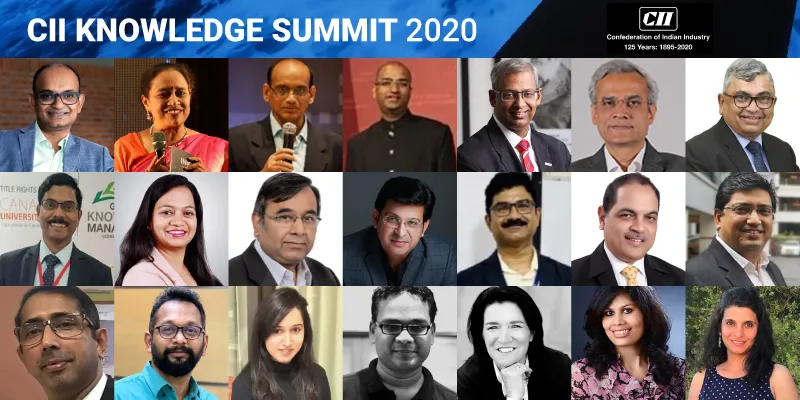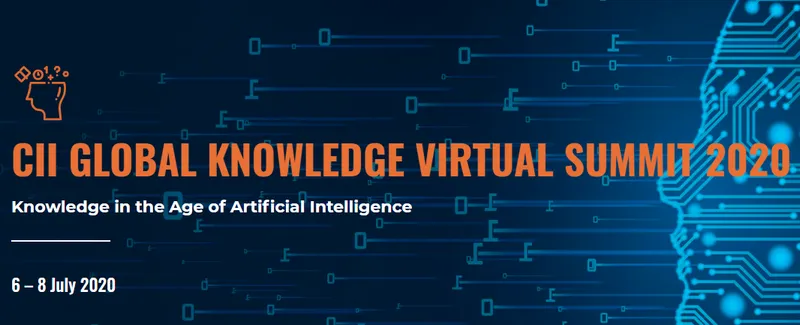From COVID-19 to climate change: CII Global Knowledge Summit showcases potential of AI, storytelling, gamification
In this preview article on CII’s upcoming annual summit, we share insights on organisational knowledge and communication. Global collaboration will be key in the post-COVID era as climate change becomes the next major flashpoint.
Business heads, management experts and authors will be speaking next week at the CII Global Knowledge Virtual Summit 2020: Knowledge in the Age of Artificial Intelligence. To be held online on July 6-8, the topics will span knowledge sharing, cognitive computing, and organisational engagement.

YourStory is the media partner this year as well (see Part I and Part II of our 2019 summit articles). In this series of preview articles, we present insights from the speakers and organisers of the CII summit, as well as experts from the Knowledge Management Global Network (KMGN).
The COVID-19 crisis has amplified the need for organisations to speed up effective knowledge-sharing practices, fortified by digital transformation. The looming climate change crisis will be the next test for global collaboration.
See also our earlier articles on Knowledge Leadership, KM in the Age of AI, Gamification, Knowledge Sharing in the COVID-19 Era, and Eye on AI.
Trends impacting knowledge organisations
“Contactless and office-less virtual environments are going to dictate the coming together of knowledge workers,” explains Ravi Shankar Ivaturi, Business Operations Senior Director, Products and Platforms, Unisys, in a chat with YourStory. He says it is going to be very interesting to see how hiring or purchases will increasingly be done without face-to-face meetings.
“Trust is going to get redefined and gain more importance than ever before. KM has an opportunity to enhance this trust quotient,” Ravi emphasises. Already, KM is helping improve innovation via submission of ideas and filing of patents (patent productivity per associate).
Integrated and distributed search, RPA-based knowledge acquisition, and anticipated knowledge delivery to individuals and projects are other trends flagged by Hariprasad Reddy, General Manager for Quality, Knowledge Management and Analytics at Wipro.
Kits for AR/VR will drive competency and knowledge about customer business process. Interactive gaming platforms will help better capture knowledge from experts, he added.
“The world of work is changed forever,” explains Rudolph D'souza, Chair of KMGN and Chief Knowledge Officer of AFCONS Infrastructure. This is due to digital transformation and the embedding and extraction of knowledge in workflow.
Traditional firms in sectors like infrastructure and construction are leveraging digital solutions for harnessing expertise, IT firms and others have embraced work from home, and educational institutes are talking of “extended classrooms”, he adds.
Older models of knowledge management (KM) had finite points of knowledge generation and application. A few “knowledge warriors” at these stations were responsible for organising knowledge capture and dissemination sessions.
“When 70 percent of the workforce of 4.5 lakh employees is in WFH mode, finite sessions for such knowledge sharing pose a challenge. The model adopted by retail organisations to understand customer sentiment and provide feedback on a continual basis will become the learning model for KM,” Rudolph observes.
As other trends, Srinivas Mahankali, Principal Consultant for Blockchain, National Institute for Smart Government, points to the continued rise of open source as well as secure and scalable cloud-enabled SAAS environments.
“Advanced automation technologies can blunt the edge of well-settled companies and throw up new paradigms and disruptive environments across the board. Large companies that are unable to adapt to change will vanish,” he cautions.
New leaders will rise in every field. Business incumbents who are not vigilant and adaptive to these changes will become victims of the ‘frog in warm water’ syndrome, he adds.

Synergy: KM and AI
Moria Levy, CEO, ROM Knowledgeware, explains that KM practitioners can play a significant role in this new world of increasing automation and AI. As part of KMGN, Moria’s taskforce is specifying how KM practitioners can work on measurement of AI impacts, identify which decision points can be supported by AI, and determine where AI can assist with knowledge capture.
Other activities of KM in AI are to facilitate peer-to-peer assistance sessions for learning from previous AI project, improve overall sensemaking and skilling, and help SMEs with capacity building.
Srinivas Mahankali of NISG explains that AI has helped timely detection and prevention of fraud in financial transactions, powered recommendation engines to maximise customer pocket share, detected and prevented malware attacks, and helped with crop recommendations based on expected demand-supply dynamics.
He cautions against a number of perceptions about AI being too expensive, causing significant unemployment, removing the human touch in interactions, and creating privacy issues. “Humans will still be responsible for laying down the vision for the business and play strategic roles. They will augment capabilities using the tools and techniques offered by AI and ML,” he explains.
“Routine tasks will be routed through AI agents. Humans will play a key role in ensuring data quality and orchestrating the Agents of Automation for achieving correct business results,” Srinivas adds.
He also emphasises the increasing role of humans in ensuring ethical outcomes from the utilisation of AI/ML-led solutions. Ideally, the CIO is best placed to “own” AI in the company due to the value of information and insights involved.
There is a lot to learn from how global leaders like Google, Amazon, and Netflix, and countries like the US, China and Singapore are leveraging AI/ML. “Always look proactively for opportunities to implement AI/ML solutions in practical scenarios,” Srinivas advises.
Hariprasad Reddy of Wipro sees KM as poised to play a very significant and breakthrough role in today’s VUCA world. “AI, automation, and machines can only increase the role of humans tending to exchange, collaborate, share, and grow by leveraging both fundamental and advanced concepts of KM,” he explains.
“The human factor will never go away. More AI automation will lead to the human element becoming even more mandated. Humans will move from solving simple to complex things,” predicts Deepak Ramasamy, Country Head for Voice, Virtual and Social Media at Standard Chartered Bank (UAE, West Africa).

Storytelling
The summit panel on storytelling features speakers from Australia and India: Gabrielle Dolan (author, Stories for Work), Sejal Vohra (author, Data Storytelling), and Ramya Ranganathan (management consultant and professor). Storytelling is a powerful platform for organisational communication, particularly in a context of information overload and rapid transformation.
Via empathetic narrative, stories can help organisations learn from failure and mistakes, and enable understanding of the broader context from data and analytics. This calls for a culture of open communication and honest self-reflection, the speakers explain.
The ongoing pandemic has showcased the power of storytelling to promote exemplary courage and dedication – as well as the cost of non-compliance and rash behaviour. In the context of the conference theme on AI, storytelling can also highlight differences between utopian and dystopian views of the future.
In the business context, storytelling can improve employee productivity, cultural cohesion, corporate branding, and customer connects. Effective storytelling and persuasion are also seen as a hallmark of great leaders, as explained by Carmine Gallo (Five Stars). Narrative intelligence is an important competence for organisations in a world of constant change, innovation and disruption, as shown by Michael Margolis (Story 10X).
Gamification
Deepak Ramasamy of Standard Chartered Bank identifies a number of impact areas for gamification in driving employee engagement, motivation and performance. “Gamification helps the staff see beyond mind-numbing metrics,” he explains.
He clarifies that gamification is about much more than “points, badges and leader boards.” Game elements and mechanics can be chosen to meet the right needs and problem statements.
Too much of the same approach leads to saturation, monotony and loss of interest. Choice of context is also important, eg. cricket instead of F1 in India. “Some games allow you to gamify more metrics than one,” Deepak explains.
Gamification is being increasingly used not just in learning but performance and culture change as well. “Gamification can also play a vital role in solving for social causes,” Deepak says.
“Have a clear and tangible RoI. Build a culture of self-governance and excellence. Keep in mind that it is play that should help you do serious things better with a smile,” he advises business leaders.
The pandemic push to knowledge sharing
“The COVID crisis yanked organisations into the Digital Era – with surprising results,” observes Rudolph D'souza of Afcons Infrastructure. He points to the way governments used digital messaging with simple and attractive graphics, and divided activities into phases with names like Lockdown 1.0, Lockdown 2.0, Unlock 1.0, and so on.
Rudolph points to the example of a wearables company putting its entire fitness regimen online for free during the lockdown period. “They epitomise the philosophy of ‘doing well by doing good’. This goodwill generated through knowledge sharing will serve them for years to come,” he says. Many individual professionals also monetised some of their knowledge by conducting direct-to-consumer classes.
“Responses to the COVID crisis showed the value of increased collaboration and video-conferencing,” observes Ravi Shankar Ivaturi of Unisys. More important was the focus on removal of points of failure, and the attention given to empathy and patience.
“Some work from office has already shifted to work from home. Some of that in turn is going to shift to work from home town,” he adds, as people revaluate decisions to live in crowded and expensive cities. “KM will have a role to play in this distributed workforce sharing a common vision,” he emphasises.
“COVID-19 has led to increased digitisation and more businesses moving online,” observes Srinivas Mahankali of NISG. This will spur data management, analytics, and automation technologies to predict demand patterns and optimise resources, along with cybersecurity.
From governments and businesses to universities and NGOs, video-conferencing and online training picked up pace due to the pandemic, observes Hariprasad Reddy of Wipro. Board meetings and awards ceremonies also moved online.
“WFH is here to stay in most industries, leading to new measures of efficiency and effectiveness. Distilling or atomising SoPs is critical, along with knowledge level assessment and work allocation,” he adds.
In the longer run, the pandemic has also triggered a revaluation of global supply chains and manufacturing. “World leaders are set to discuss and debate strategies for ‘going local,’ reversing earlier trends of ‘going global’ in times to come,” Hariprasad predicts.
Beyond COVID: climate change
“Humans are a remarkable species and capable of achieving incredible outcomes – if they are pushed into changing,” explains Arthur Shelley, Founder of Intelligent Answers.
“The majority of people are not good at proactively changing themselves, although fortunately some are. These proactive members of our species are the role models for emerging trends,” he says.
“I optimistically believe that the COVID crisis has triggered an increased focus on the more important aspects of quality of life for many people,” Arthur adds. This includes WFH and investing an extra couple of hours with family rather than commuting.
He asks: Why should one be “going back to normal” when you can “proceed forward” to something better? The entrepreneurs who see this opportunity to generate new products and services will set the trend, he adds.
“The COVID crisis was a catalyst to triggering changes – some good, others not. Leaders who used scientific analysis were more successful than those who engaged in denial or political posturing, leading to the most cases and deaths,” he observes. “Those countries who took the hard short-term decisions early had among the lowest cases and deaths,” Arthur adds.
Knowledge sharing is contextual; decisions influence the behavioural environment, which either elevates humanity or demonstrates the worst of it. This is also revealed in the diversity of perceptions and responses to shared knowledge in the case of the climate change crisis, he explains.
“COVID-19 did not destroy the economy, it was the disruptive catalyst that highlighted the weaknesses in this unsustainable system,” Arthur emphasises. He calls for greater reflection and action on lifestyle, sustainability and wealth distribution as humanity tackles the crisis of global warming.
(Edited by Teja Lele Desai)









